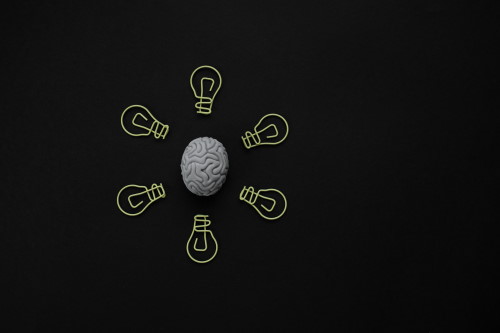When it comes to supporting brain health, improving mental capabilities, and even reducing the risk for dementia, a healthy diet that provides minerals and vitamins for brain health is one of the most important puzzle pieces. In other words, a healthy brain starts with eating a variety of healthy, nutrient-dense, whole foods to ensure you’re getting enough of the right nutrients, so your brain can perform at its best.
Indeed, research has backed key nutrients, including vitamins, minerals, flavonoids, and essential fatty acids to help support the brain, potentially improving focus and attention, slowing cognitive decline, and reducing the risk for dementia. 1,2 The MIND Diet is one of the best examples of a diet associated with a healthy brain. 3
7 Best Vitamins for Brain Health
BREAKING: Boost Your Memory With This Easy Trick
1. Vitamin B12
Being deficient in Vitamin B12 (cobalamin) is entirely too common, with up to 40% of older Americans over 60 not getting enough. 4 This lack, unfortunately, can lead to fatigue, memory loss, mental fogginess, and mood symptoms. 5 Vital to brain health, a deficiency in this vitamin has even been associated with brain atrophy or shrinkage. 6
While this is an issue with vegans as vitamin B12 is more available in animal foods like beef, liver, chicken, fish, shellfish, yogurt, and eggs, it can also result from malabsorption of the nutrient. Fortified foods and supplements may be more easily absorbed. That said, if you aren’t deficient, vitamin B12 may not have much of an impact. A simple blood test can help you find out if your body is getting enough or if you may need to increase your intake or potentially supplement your diet.
2. Vitamin B6
Speaking of B vitamins, another important one for brain health is vitamin B6 as it boosts the production of neurotransmitters, which are needed to pass messages between neurons in the brain and body. Deficiency of this vitamin has also been linked to an increased risk of depression. 7
Beans are a great source of vitamin B6 as well as other B vitamins, and B6 can also be found in tuna, salmon, poultry, dark leafy greens, bananas, and oranges.
3. Vitamin B9
The last B vitamin to ensure you’re consuming enough of for brain health is folate or vitamin B9. It can be found in eggs, greens, broccoli, whole grains, sunflower seeds, and peanuts. 8
4. Vitamin D
Another common nutrient many folks are deficient in is vitamin D—with up to 40% of Americans being deficient. 9 Every cell in our bodies needs this nutrient/hormone to thrive. And deficiencies have been associated with decreased memory, lowered cognitive performance, increased levels of depression, and even dementia, including Alzheimer’s disease, and stroke. 10 – 12
The best way to get enough vitamin D is through safe sun exposure. You can also get vitamin D from foods like cod liver oil, salmon, tuna, sardines, beef liver, and mushrooms. 13 You can then add sensible supplementation if necessary. It is worth noting that you can also have too much of a good thing, especially if you supplement with vitamin D. That is, there are health implications if you get too much vitamin D, so it’s important to have your levels checked regularly to ensure you are getting enough but not too much.
5. Vitamin E
Another one of the best vitamins for brain health is vitamin E. This is because vitamin E has antioxidant properties and helps protect cells from free radicals and oxidative stress. The brain is particularly susceptible, especially as we age, so a deficiency appears to be a major contributor to declining brain health. 14
Foods rich in vitamin E include dark leafy greens, red bell peppers, asparagus, pumpkin, avocado, nuts and seeds, and wheat germ oil.
6. Vitamin C
Vitamin C is perhaps best known for its powerful effects on fighting antioxidants and supporting a healthy immune system. But it’s also known to help support brain health by tamping down damaging inflammation. 15
Eating foods high in vitamin C and other flavonoids, such as strawberries, has been shown to potentially decrease the risk of developing dementia. 16 Other foods high in vitamin C include other berries, kiwi, bell peppers, citrus fruits, tomatoes, and Brussels sprouts.
7. Magnesium
Moving over to minerals, magnesium is another essential nutrient vital for healthy energy production and brain functioning, and many people simply don’t get enough. 17 One of the main reasons magnesium may assist with brain health is because it’s important for the positive response to stress. Stress, as most of us know firsthand, can impair memory, decrease concentration, and increase anxiety. 18 In addition, low magnesium levels have been associated with reduced cognition and reaction time. 19 – 21
Foods high in magnesium include beans, seeds, and spinach. And it can also be found in supplements, which may be beneficial for supporting brain functioning. 22
Other Key Nutrients for Brain Health
In addition to minerals and vitamins for brain health, other nutrients may support memory, mood, and other brain functioning. These include:
• Omega-3, which is most commonly found in fatty fish. Remember, our brains are mostly made of soft, fatty tissue. To maintain healthy communication through neurons, the brain needs omega-3 fatty acids. Eating fish like salmon, sardines, and herring regularly supports brain health, as does consuming foods like walnuts and flaxseeds. If you are unsure if you’re getting enough from your diet, high-quality omega-3 supplements may be helpful for supporting brain health. 23 – 26
• Curcumin, found in the spice turmeric, which may improve cognitive function, memory, and mood 27, 28 due to its impact on gut health, circulation, and supporting the body’s healthy response to inflammation. 29, 30 One placebo-controlled study even found curcumin was able to help improve attention and memory within an hour of consuming it. 31
• Rhodiolia rosea is an adaptogen that may help support mood, fight fatigue, and improve reasoning by supporting serotonin levels. 32, 33
• L-Theanine is an amino acid that has been shown to help calm neurotransmitters. It may help reduce tension, improve mood, and lower stress. 34 Some research suggests it may also help improve cognitive functioning and learning ability. 35
• Specific mushrooms, such as Lion’s Maine, Reishi, and Chaga, are also being examined for their potential positive effects on brain health. While more research is needed, these mushrooms are believed to help support healthy inflammation levels, which may support improved focus, mood, and memory. 36
Best Vitamins for Brain Health: A Recap
TRENDING: Eat This - Never Forget A Single Thing Again
Nutrition, including consuming the best minerals and vitamins for brain health, is a big step to keep the brain sharp. But it’s not the only way to support a healthy brain. It’s also vital to exercise consistently, practice healthy sleep hygiene, decrease consumption of ultra-processed foods, maintain strong social connections, and stay active in general. 37, 38 Not only can these lifestyle choices help improve your memory, focus, and attention, but they may help reduce the risk for dementia and mental decline in the long run.
It’s also important to watch for undiagnosed medical conditions, as the loss of concentration, memory, or ability to process information can indicate problems that are best addressed with the help of a healthcare professional. Just a few of the conditions that can impact brain function include Hashimoto’s thyroiditis, obesity, celiac disease, and anxiety disorders. 39 – 41









